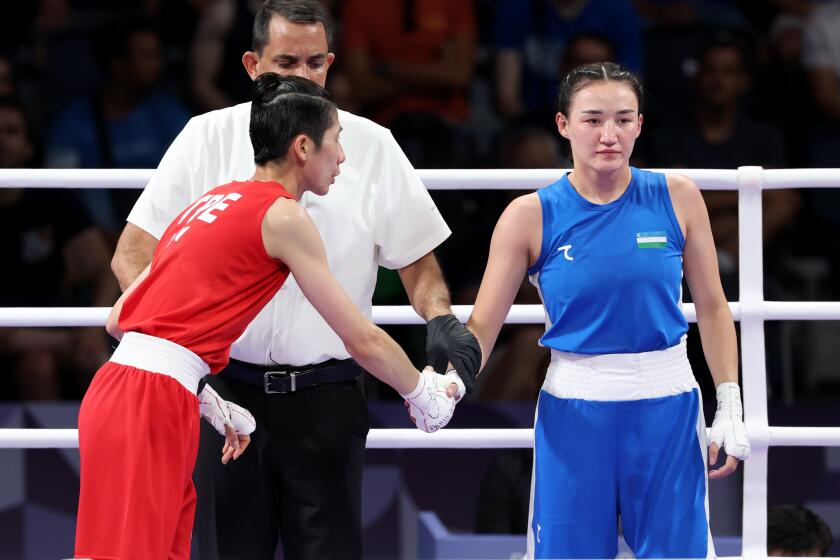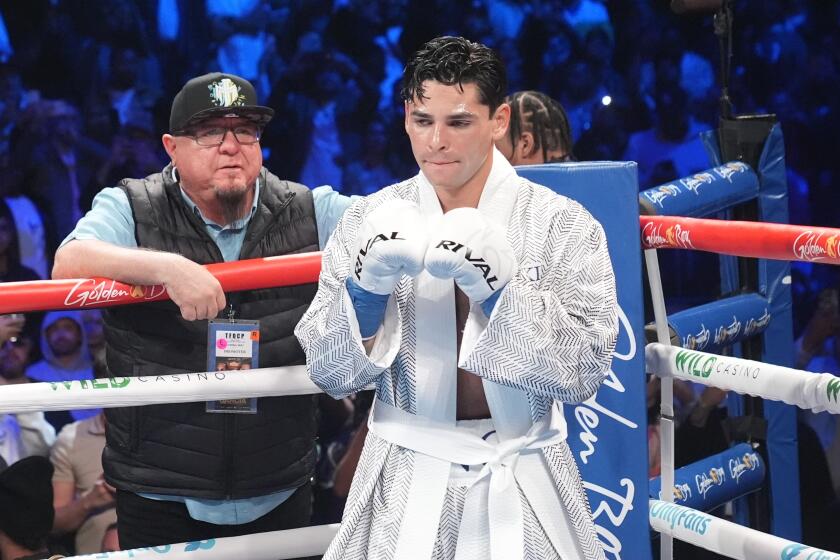Don Elbaum Matriculates From a Pianist to Promoter
Don Elbaum is in misery. “Oh, God, this is terrible, this is the worst. Aaaah, I can’t even speak.”
But he goes right on. Elbaum never has not spoken, ever since he’s been able to speak.
“I’ve lost my phone book. I think I left it in the airport in Westchester. I know it. I called the airport. Nothin’. Aaaah.”
Here’s a boxing promoter and matchmaker with no phone numbers and a fight coming up April 1: Jamaica-born, Washington-raised Simon Brown vs. Tyrone Trice, in the Starplex-District of Columbia Armory. And Elbaum has lost his little book. He claps his forehead.
“My partner’s wife says to me one day, ‘Don, let me Xerox each page for you.’ I says, ‘Okay.’ But then I never do it. I never did it!
“Ten years of numbers. It’s worse than losing your girl.”
Elbaum is a short man with a face from central casting for every Rocky sequel.
In times of crisis his eyes narrow to hyphens.
There’s always a crisis.
The New York Post has just seared him six ways, alleging even some machinations surrounding the Brown-Trice fight. As he reads the article, his lids descend until finally one would swear his eyes were shut.
He finishes reading and the phone rings. This is in his Rockville, Md. hotel room, strewn with newspapers, fight posters propped against a wall. It’s Bob Lee, International Boxing Federation president, wanting to know about this highly unflattering article. The kindest cut was calling Elbaum a “vagabond promoter.”
(A wanderer he is. Look, Elbaum says, he hasn’t had time to find a place to live since he moved out of Atlantic City, but he’s considering settling down. He says he wants to relocate in Fort Lee, N.J.)
But now he must address the IBF major-domo:
“It’s no big thing. Nothing. Nothing. . . . This is absolutely not true about the 75,000 dollars (for Trice) instead of the 100,000. . . . Everything’s agreed upon. . . . We’ve got the money and we’ll distribute it as we’re supposed to distribute it. . . . There’s no problems at all. Everything is good.”
It’s as good as it gets for Elbaum. He’s never had a fighter like Simon Brown. Once he had Aaron Pryor; Pryor had talent, but Pryor had troubles too.
Not in all his years has Elbaum sensed the opportunity he sees in Brown, and he’s been in the fight game since he was 13 or thereabouts. He’s still not happy about giving his correct age, now 49, because, well, he’s divorced and has his eyes open, sort of. “I admit to 45,” he says.
You name it, Elbaum has tried to sell it. He sold advertising on the soles of some pug’s shoes because he knew the soles were sure to be seen.
He put on a four-rounder in Warren, Ohio, “at either the Moose or the Elks club” to decide “The World’s Worst Fighter.” He matched an 0-13 guy with an 0-15 guy. At stake was a trophy that he had had inscribed to give the loser: “The World’s Worst Fighter.” They fought to a draw.
But now the pressure’s really on Elbaum. This is no pug he’s promoting in Simon Brown. Brown is the IBF welterweight champion. He’s been champion two years, defended his title six times. He hits like a 151 rum punch.
What? Never heard of Simon Brown?
Well, that’s the Don Elbaum crisis of the moment. He needs a marquee fight to make Simon Brown a marquee fighter.
He needs Marlon Starling or Mark Breland or Julio Cesar Chavez or, even, Roberto Duran. (Better yet, Elbaum would concur, a pasta-filled Duran.)
“Simon,” says Elbaum, “may be like Marvin Hagler. You know how long it took Hagler. Nobody would get in the ring with him. I got the same situation. The ones who count know how great a fighter Simon Brown is. They won’t get in the ring with him.”
Simon Brown knows about Hagler’s long road to recognition and, yes, at age 25 has decided he’s on a similarly circuitous course, replete with hairpin curves: three trainers, almost a fight with Starling -- only to have it fall through.
“A lot of people come to me and they will say, ‘You know, you shouldn’t be fighting that guy, you should be making that kind of money.’ But thank God for what I’m making. Because I got a beautiful home and I’m supporting my wife and kid and I’m eating. If it wasn’t for boxing I wouldn’t have these things. Boxing has been good to me, and it’s going to be much, much better as time goes on.”
Sometimes Brown can’t help thinking “when?”
“When I’m at my house, just me and my wife, I lay back and discuss it with her. I say: ‘At this point I would like to fight a Chavez. I would love to fight Breland. Starling. Even a Michael Nunn. Even a Leonard.’ But, unfortunately, it seems like I just can’t cross that line. I don’t know what that one thing is, why I can’t cross that line. I’m still trying to find the answer myself.”
So is Elbaum. The search goes on. “I just leave it up to Don Elbaum,” Brown says. “Let him worry about that, let Simon concentrate on training. Because if Simon don’t win, he won’t get nowhere.”
Simon Brown and Don Elbaum met in Atlantic City in 1982. Elbaum was promoting weekly bouts there. Washington trainer Jose “Pepe” Correa called from Washington and said he had two promising fighters, Brown and Maurice Blocker. Brown put them on a card. One look on fight night and Elbaum signed Brown to a five-year promotional contract. Along the way, Elbaum has gotten the contract extended, and in 1988 persuaded a money man to come in with him. That’s big Al Balboian, who owns the New York Terminal Market in the Bronx, where he moves fruit. He is very big in bananas.
Simon Brown and Al Balboian are delightful associates, Elbaum says. If only they were the only ones with whom he had to deal.
Last time through Washington, for instance, Elbaum and Burtell Jefferson, head of the D.C. Boxing Commission, argued so loudly they could be heard outside the closed door of Jefferson’s office. Jefferson threatened disciplinary action against Elbaum for “unprofessional” behavior during the argument.
Now Elbaum is on the phone, trying to fill out the undercard for Brown-Trice. He runs his hand through his combed-back black hair. He’s dressed in black. He doesn’t know that Vogue’s editor has declared black a noncolor. “I read Cosmo,” he says.
“The problem I have on that is,” he is saying on the phone, “he’s got to have a winning record. ... Who can we get out of West Virginia? Who can we get out of Miami? Well, give me somebody they can verify has a winning record.”
A knock at the door produces two sparring partners. One wants to get paid. They come in and sit down and Elbaum spreads out a list of one of the fighter’s long-distance calls. The fighter can’t believe he made that many. But Elbaum knows the tally is true.
“You want me to take it out this week or next week?”
Long pause for thought. At length: “Take it out next week.”
To think, Don Elbaum could have grown up to be a concert pianist.
“I was considered a child genius. I was written up. I had front-page stories. Someplace I got ‘em, about being a child prodigy and so forth.”
That was back in Erie, Pa., where Elbaum grew up “on the right side of the tracks.” His father was a successful businessman and leading citizen, his mother an accomplished pianist. “I was the only child and the black sheep.”
His course veered from Carnegie Hall this way:
“I used to sit at that piano. One day I looked outside the window. I saw my friends playing. ‘Ma, I wanna go outside.’ This is like yesterday. I go out. ‘Get back in the house.’ ‘Ma, I don’t want to play the piano anymore.’ “So my teacher comes over for my lessons -- Mrs. Gulf, or Mrs. Golf. I don’t know if it’s Gulf or Golf. She says: ‘He’s been playing since he was 4 years old. Let him go out. He’ll be back.’
“I never sat down again.”
Instead, he’d go off with his father to the fights in Buffalo, Pittsburgh and Cleveland. They’d drive or take the train. The father was just a fan, but the son got serious. He had 60 amateur fights. After graduating from high school, he set out for Chicago to further his boxing -- promising his father that he’d go to college. He did. He went to three colleges. His stint at Penn State was fairly typical. He made it to the campus but not to a class.
He turned pro as a lightweight and went 6-3-1. His problem: “I couldn’t break open an egg.”
At the same time he was promoting. Having put together his first fight card when he was 18, he became known in certain circles as the “Boy Promoter.” Three times he filled in as a fighter on his own card.
“My favorite line, and this is true, when we’d step in to the middle of the ring for the instructions -- it’s my show, remember -- I’d say to the other guy, ‘Don’t forget who’s payin’ ya.’ ”
This one time in McKeesport, Pa., when he was both promoting and fighting on the same night, “I paid myself $2,500 because that’s the most money any fighter ever got for a six-round fight in the Pittsburgh area. The promoter lost money.”
Elbaum went on to work for Don King but said he “walked away” several years ago. He had a piece of heavyweight Tony Tubbs, but unfortunately sold out to King before Tubbs’s Tokyo payday with Mike Tyson. Elbaum has been wrong before, but he’s sure he’s right when he says, “Nobody’s going to beat Simon.”
Simon Brown battled his way out of a gym located in the basement of the Calvary United Methodist Church on Columbia Road in Washington, D.C. His mother, Eva, always prayed for him to be religious.
She says her minister at the Church of God on Georgia Avenue still believes Simon is destined to become a preacher.
Simon isn’t committing, but he’s clearly been faithful to boxing. He’s 31-1 with 23 knockouts and always keeps himself sharp enough to fight. A tireless gym worker, he may have gotten his determination from his father, once a farmer in Jamaica. Isaac Brown would take Simon to work with him in the fields.
In the ‘70s the Browns -- Simon has two brothers and three sisters -- settled in Washington. Watching the 1976 Olympics on television, Simon was captivated by Sugar Ray Leonard. Simon’s mother didn’t like the idea of her son boxing, but eventually decided it was God’s will, “as long as he doesn’t go in with a wicked heart.”
With his earnings, Brown has bought a five-bedroom house in Germantown, where he lives with his wife, Lisa, and their 3-year-old daughter, India. They are expecting a second child. Simon says the countryside reminds him of Jamaica. “Next year I may go out further,” he says.
Since winning the title from Trice, Brown has steadily improved his reputation as a boxer. Many authorities consider him the best welterweight even though only the IBF recognizes him as such. Starling (whose split decision over Brown in 1985 is Brown’s lone setback) holds the World Boxing Council title; Breland has the World Boxing Association version. But neither has shown an inclination to fight Brown -- although Elbaum came close to making a Starling fight.
It was almost set: Starling would get $750,000, Brown $400,000.
“I said, ‘If we get 450,000 we’ll take the fight’,” Elbaum says. “I said: ‘Take 25,000 dollars from Starling. Get Showtime to put up another 25,000.’ No one budged. Everyone accused me of turning down 400,000, which would have been Simon’s biggest payday. But no one can tell me that Simon was worth half the money Starling was getting, which was just about what it was.”
So Elbaum turned it down on principle?
“Yeah. Yeah. Because Simon was getting the short end of the stick, that’s why. Because they thought we were that hungry.”
As he waits for his big fight, Brown has switched trainers once again. He’s gone from Correa to Teddy Atlas to former welterweight and middleweight champion Emile Griffith. “I feel comfortable with him,” Brown says. “He’s sharpened me up on what I already know.”
More to Read
Go beyond the scoreboard
Get the latest on L.A.'s teams in the daily Sports Report newsletter.
You may occasionally receive promotional content from the Los Angeles Times.










